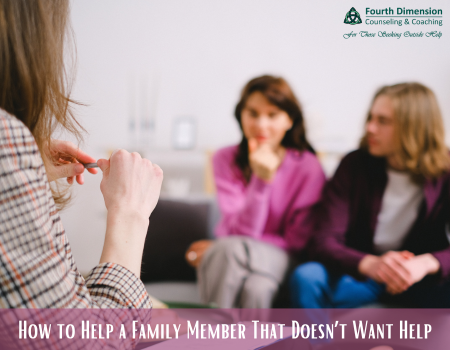Supporting a family member in distress can be an emotional and challenging experience, especially when they resist assistance. Whether they’re dealing with mental health struggles, addiction, financial issues, or any other difficulty, watching someone you care about reject help can leave you feeling helpless and frustrated. However, it’s important to approach the situation with patience, empathy, and strategic actions. Here are practical steps to help a family member who doesn’t want help while maintaining your well-being.
Tips for Helping a Family Member
-
Understand Their Perspective
 One of the most significant reasons people resist help is that they feel misunderstood or judged. Taking the time to understand your family member’s perspective can make a big difference:
One of the most significant reasons people resist help is that they feel misunderstood or judged. Taking the time to understand your family member’s perspective can make a big difference:
- Listen Without Judgment: Let them express their feelings, thoughts, and fears without interrupting or criticizing. This shows that you respect them, and also, it creates a safe space to communicate openly.
- Empathize with Their Situation: Try to see things from their point of view, even if you disagree. Empathy can help build trust and may eventually open the door for constructive conversations.
- Acknowledge Their Autonomy: Recognize that they have the right to make their own choices, even if those choices seem unwise. Respecting their independence can reduce resistance to your support.
-
Educate Yourself About the Problem
Before offering help, it’s crucial to understand what your family member is going through. Misconceptions or incomplete knowledge can lead to misguided advice that may alienate them further.
- Research the Issue: Learn about their challenges—be it mental health conditions, addiction, or financial struggles. This provides you with the right information and also helps you to provide support from an informed position.
- Avoid Myths and Stigmas: Misunderstandings about sensitive topics can unintentionally cause harm. Use reputable resources or speak with professionals to clarify any doubts.
-
Offer Support, Not Solutions
When someone resists help, pushing solutions on them can make them feel overwhelmed or defensive. Instead, focus on offering support that respects their boundaries:
- Be Available: Simply knowing they have a support system can be comforting.
- Help in Small Ways: Offer practical assistance that doesn’t feel invasive, such as running errands, cooking meals, or simply spending time together.
- Avoid Overstepping: Resist the urge to take control of their situation. Instead, ask, “How can I help?” and respect their response, even if if they say that they don’t need help.
-
Lead by Example
Sometimes, actions speak louder than words. Showing healthy behaviors and coping mechanisms can inspire your family member to consider change:
- Model Self-Care: Demonstrate how you manage stress, seek help when needed, and make positive choices. This can subtly encourage them to do the same.
- Share Personal Experiences: If appropriate, share your own struggles and how you overcame them. It has a way of helping them feel less alone.
-
Set Boundaries
While it’s natural to want to help, it’s important to protect your own well-being. Overextending yourself can lead to burnout and resentment, which may harm your relationship with your family member.
- Define Your Limits: Be clear about what you can and cannot do.
- Avoid Enabling Harmful Behaviors: Sometimes, well-intentioned help can perpetuate unhealthy patterns. For instance, constantly bailing someone out financially may prevent them from addressing their underlying issues.
- Prioritize Self-Care: Take care of your mental and emotional health. Seek support from friends, therapists, or support groups if you feel overwhelmed.
-
Encourage Professional Help
Many challenges require specialized expertise that family members may not be able to offer. Encouraging your loved one to seek professional assistance can be an important step forward.
- Normalize Seeking Help: Help them see that seeking professional support is a sign of strength, not weakness. Share examples of people who’ve benefited from therapy or counseling.
- Provide Resources: Offer information about relevant professionals, support groups, or helplines. Make it easy for them to take the first step.
- Avoid Ultimatums: While it’s tempting to demand that they seek help, this approach often backfires. Rather, encourage them gently and be patient with them.
-
Be Patient and Persistent
Helping a family member who resists help is often a long and challenging process. Change doesn’t happen overnight, and setbacks are common.
- Celebrate Small Wins: Acknowledge even minor progress, such as them opening up about their feelings or considering a new perspective.
- Stay Consistent: Regularly check in with them, even if they don’t seem receptive. Consistency shows you care and are willing to support them when they’re ready.
- Recognize When to Step Back: Sometimes, stepping back is necessary to protect your relationship and mental health. Letting them face the natural consequences of their choices can sometimes be the catalyst for change.
-
Know When to Seek External Intervention
In some cases, refusing help can put your family member or others in immediate danger. If this happens, it may be necessary to seek external intervention, such as involving social services, law enforcement, or a crisis hotline.
- Act with Care: Make sure your actions prioritize their safety and dignity.
- Follow Expert Advice: Consult with professionals to determine the best course of action in critical situations.
Helping a family member who doesn’t want help is a delicate balancing act. It requires empathy, patience, and respect for their autonomy while protecting your own well-being. When you foster trust, set boundaries, and offer unwavering support, you can create an environment where they feel safe to seek help when they’re ready.
